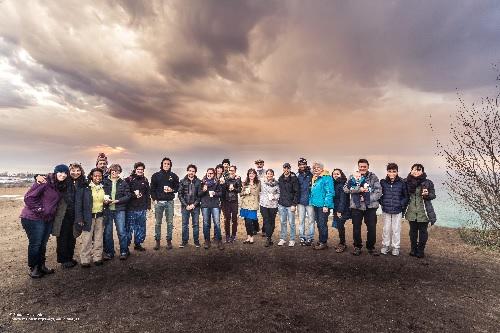Romero House is home to a vibrant community, made up of refugees, staff, volunteers, and neighbours. The photo at left depicts members of the Romero House community at their Easter Sunrise Service.
*
“Now, I know kids grow quickly and go through a lot of clothes,” I said. “You are welcome to come down and get clothing anytime.” I was standing in the Romero House boutique with our newest resident. And then she started to cry.
“I’m sorry,” she said, “it is just that we had to leave home so unexpectedly and only brought one suitcase. I’m just … thank you.”
I’ve been living with refugees at Romero House for nearly four years. The people I live with are my neighbours, they are my friends. We put out the garbage together on Friday morning and watch cartoons together on Saturday morning. I have a tendency to show up to visit right at the moment that dinner is being put on the table—especially the kitchen table of my neighbours from Yemen. The food they cook is so good.
In the day-to-day normalcy of life, I sometimes forget that the people I live with are refugees. I forget that they’ve lost so much and have probably experienced tremendous suffering. Moments like the one I had at the boutique bring me back to that reality. The person in front of me had to leave everything behind. She left her job, home, friends, family, language … everything.
I think it is a good thing, in a way, that I sometimes forget that my friends and neighbours are refugees. By that, I don’t mean it is a good thing to ignore suffering or the pain my neighbours have experienced. Romero House exists to walk alongside people in the midst of their suffering. But we hear so much about refugees in the media. We talk about refugees in our churches. We follow the political debates about refugees. To be a refugee is to be an issue, a topic … it is an identity that is given to someone.
What I have learned at Romero House is that refugees are simply ordinary people walking through an extraordinarily difficult time in their lives.
It is when we remember that we are all just people that we see each other as God sees each one of us. We aren’t refugees and charity workers. We aren’t Canadians and foreigners. We aren’t legal or illegal. We are all just children of God.
*
Jenn McIntyre is a part-time Wycliffe student, enjoying her theological education one class at a time. The rest of the time, Jenn is hanging out at Romero House, a community in the West End of Toronto where she lives alongside refugee families. She loves disco balls, Latin dance tunes and potlucks with lots of spicy food.





